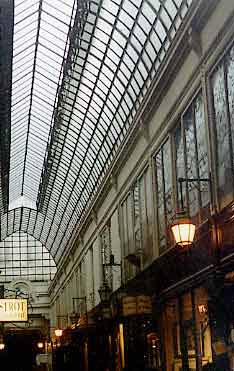Paris Capital of the Arts
dal 25/1/2002 al 19/4/2002
Segnalato da
Niki de Saint-Phalle
Ellsworth Kelly
Kathleen Brunner
Eric de Chassey
Gladys C Fabre
Simonetta Fraquelli
Nicholas Hewitt
Katarzyna Murawska-Muthesius
Kenneth Silver
Sarah Wilson
Norman Rosenthal
Ann Dumas
25/1/2002
Paris Capital of the Arts
Royal Academy of Arts, London
From 1900 to 1968, Paris saw itself as the world capital of the visual arts, a global magnet for artists attracted by the dynamism of the French capital and the spirit of creativity that prevailed. Beginning in 1900 with the World Fair, and ending with the street riots in 1968, the Royal Academy’s ambitious exhibition of over 250 paintings and sculptures will explore the dramatic impact of the major art movements that emerged in the context of social and political change in Paris.

From 1900 to 1968, Paris saw itself as the world capital of the
visual arts, a global magnet for artists attracted by the
dynamism of the French capital and the spirit of creativity that
prevailed. Beginning in 1900 with the World Fair, and ending
with the street riots in 1968, the Royal Academy’s ambitious
exhibition of over 250 paintings and sculptures will explore
the dramatic impact of the major art movements that
emerged in the context of social and political change in Paris.
Paris: Capital of the Arts 1900-1968 will feature work by the
great figures of the modern movement, such as Matisse,
Léger and Duchamp, who were joined in Paris by artists from
all over the world - Picasso, Miró and Dalà from Spain, Chagall
and Kandinsky from Russia, Giacometti from Switzerland,
Brancusi from Romania, Modigliani from Italy, Foujita from
Japan, Beckmann from Germany and Calder from America -
thereby creating an extraordinarily fertile environment for
artistic innovation. After the second World War, a new
generation of artists including Jean Tinguely, Niki de
Saint-Phalle and Ellsworth Kelly were also attracted by the
spirit of innovation and experiment of the French capital.
Four geographical areas of Paris, reflecting the city’s evolving
social and intellectual centres over the years, provide an
evocative structure for the exhibition: Montmartre
(1900-1918) - birthplace of Cubism, where Braque and
Picasso participated in the greatest pictorial revolution since
the Renaissance. Montparnasse (1919-1939) - citadel of
pleasure, where artists embraced chic café society, and
witnessed the rise of Surrealism.
St Germain des Près (1940-1957) - centre of artistic
conscience that reflected disturbing developments during the
Nazi occupation, and the emergence of existentialism after
the War. The Latin Quarter (1958-1968) - torn posters,
crushed cars and shot paintings express a violent artistic
response to Paris in the ‘60s, culminating in the political
upheaval of May 1968.
This major exhibition, which will be travelling to the
Guggenheim Museum, Bilbao, after its showing at the Royal
Academy, will chart the astonishing richness and diversity of
the visual arts in Paris during these remarkably creative
decades, and anticipate many of the concerns that have
re-emerged in the art of the 21st century.
In association with BBC Radio 3
Sponsored by Merill Lynch
ORGANISATION
The exhibition has been organised by the Royal Academy of
Arts. It has been curated by Sarah Wilson of the Courtauld
Institute of Art, together with Norman Rosenthal, Exhibitions
Secretary, and Ann Dumas, curator, of the Royal Academy of
Arts.
PUBLICATIONS
The exhibition will be accompanied by two landmark
publications. The exhibition catalogue will feature nine essays
by leading international scholars - including Kathleen Brunner,
Eric de Chassey, Gladys C Fabre, Simonetta Fraquelli, Nicholas
Hewitt, Katarzyna Murawska-Muthesius, Kenneth Silver and
exhibition curator Sarah Wilson - as well as a fully illustrated
timeline. A photographic history Paris Pictured: 1900-1968 by
Julian Stallabrass, featuring work by some of the greatest
photographers of the period including Brassaï, Cartier-Bresson
and Doisneau, will also be published to accompany the
exhibition.
Image: The Passage Jouffroy, Montmartre
EVENTS PROGRAMME
Paris: Capital of the Arts 1900-1968 will be complemented by
a diverse programme of special events organised by the
Royal Academy including concerts, evening and lunchtime
lectures, and courses.
The French Institute will also be supporting Paris: Capital of
the Arts: 1900-1968 with a programme of cultural events,
films and conferences. Invited celebrities and luminaries from
the worlds of literature, film and art will talk about how the
1950s and 1960s inspired their work. The full programme will
be available from the French Institute in December.
DATES
Open to public: Saturday 26 January - 19 April 2002 10am - 6pm daily (last admission 5.30pm)
Late night opening: Fridays until 10pm (last admission
9.30pm)
ADMISSION
£9 full price; £8 concessions; £6 full-time students; £2.50
12-18 years + Income Support; £1.50 8-11 years.
TICKETS
For details of advance booking, call 020 7300 5959 or email:
boxoffice@royalacademy.org.uk
Royal Academy of Arts Burlington House Piccadilly London WIJ OBD
For further press information please email or telephone Caroline
Birchall or Sarah Davies on 020 7300 5615/5610 or fax 020
7300 5886.



